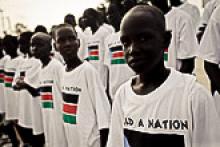On 9 July 2011 the world witnessed the birth of a nation - South Sudan, Africa’s 54th country. In an interview with UN Women, South Sudan’s Minister of Gender, Child and Social Welfare Agnes Lasuba weighs in on the country’s independence and what it means for women. 'The women of South Sudan played various roles to achieve independence. During war they picked up arms. Others were mobilisers and others were taking care of the wounded, the sick and the elderly. And others were yearning for peac...read more
On 9 July 2011 the world witnessed the birth of a nation - South Sudan, Africa’s 54th country. In an interview with UN Women, South Sudan’s Minister of Gender, Child and Social Welfare Agnes Lasuba weighs in on the country’s independence and what it means for women. 'The women of South Sudan played various roles to achieve independence. During war they picked up arms. Others were mobilisers and others were taking care of the wounded, the sick and the elderly. And others were yearning for peace and they took it upon themselves to lobby other people and other countries, so that there could be peace for them and for their children,' says Lasuba in the interview.



































